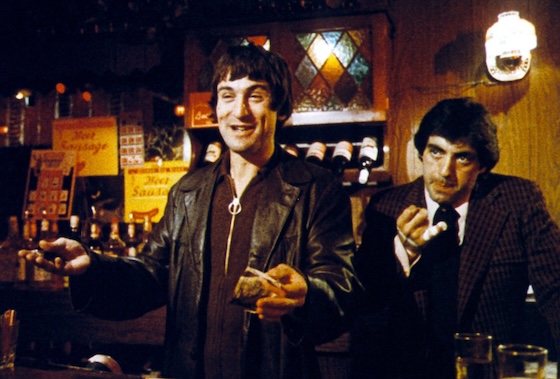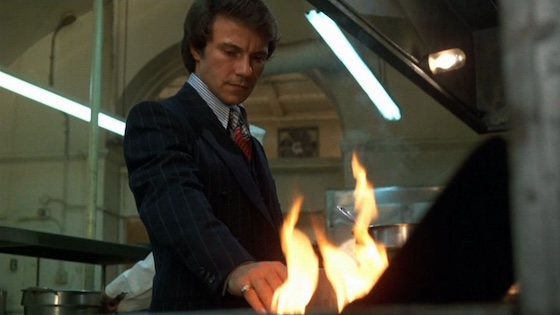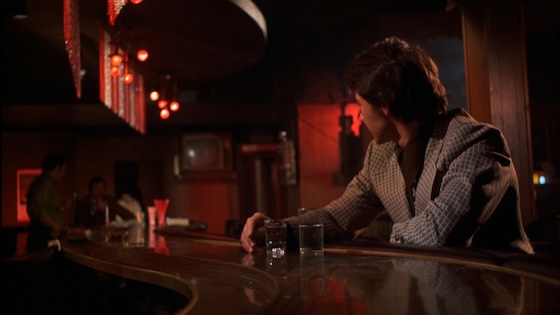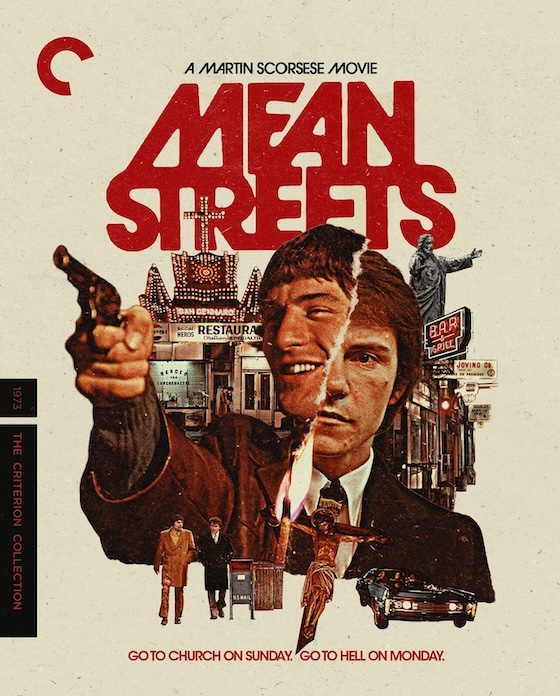
“You don't make up for your sins in church. You do it in the streets. You do it at home. The rest is bullshit, and you know it.”
It’s the film that put the legendary Martin Scorsese on the map. And rightfully so. With its bare-bones, energetic filmmaking style, Mean Streets is a gangster flick that kicks you in the face with its shameless grit and rawness. We, of course, now are more than well acquainted with the unmatched talent of the master director who’s gifted us with masterpieces like Taxi Driver, Raging Bull, Goodfellas and plenty more. But back in 1973, Mean Streets announced Scorsese’s arrival as a promising and pioneering filmmaker, and thanks to the Criterion Collection, his directorial breakout film starring Harvey Keitel and Robert De Niro (perhaps you’ve heard of those guys before) is now available to been seen with a sweet new 4K release.
Charlie Cappa (Keitel) is a devout Catholic man….and he’s also a gangster. An Italian-American in New York City, Charlie works for his powerful mobster Uncle Giovanni (Cesare Danova) and aspires to move up in the mob ranks. But Charlie’s got a couple of problems. The biggest one: Johnny Boy Civello (De Niro). Charlie loves the kid. He vouches for Johnny Boy. He gets mafia loan sharks like Michael Longo (Richard Romanus) to give Johnny Boy more time to pay back the money he borrowed. But Johnny Boy…yeah, he’s a pain in the ass. Destructive, unpredictable, and unreliable.
The other problem: Charlie’s got a secret girl – Teresa (Amy Robinson). She’s none other than Johnny Boy’s cousin and she’s got epilepsy – a condition that’s more than frowned upon by the mob and Uncle Giovanni’s told Charlie to stay away from her for that reason. But, of course, Charlie can’t help himself with either Teresa or Johnny Boy. And that’s going to make things bad for Charlie – real bad.
Mean Streets has a lot of youthful energy that presents itself in different ways. For a good chunk of the beginning of the picture, there’s the feeling similar to that of a hang-out picture dropping us into the seedy bars and nightclubs and the frequented pool halls of Charlie and his friends (and business acquaintances) of the 1970’s. A good time can quickly become hostile in these places. There are bursts of immature, explosive violence usually instigated by someone being a hard-ass or a lunatic. But Scorsese, though he does shoot these scenes with an incredibly hectic and powerful energy by utilizing a frantic hand-held camera for a lot of the scenes, is careful to never romanticize the violence. But rather, he portrays just how volatile this world and the people who live in it are. And loosely based on a particular period of time in Scorsese’s life, you can tell and you can feel just how personal this film is in its stark realism.
As a leading man, Keitel surely holds his own as the aspirational yet eternally frustrated Charlie just trying to make everything in his life work. But as it has been said before, De Niro does stand out as the insufferable Johnny Boy. As a character, you’re in constant annoyance by his disruptive and anarchist attitude that’s dangerous to not only himself but to everyone around him, especially to Charlie and his reputation. But as a performance, De Niro, no doubt, is a scene-stealer in Mean Streets.
And of course, we have to talk about the music. By today’s standards, the way Scorsese utilizes music in Mean Streets isn’t anything new, but at the time it definitely was. The songs, that’s heavy on the rock and roll like The Rolling Stones, is a character itself in the picture. Music lives and breathes in the picture, woven in to the very fabric of it. And though this usage of music has been copied throughout the years in other films, seldom has it been utilized as well as Mean Streets does.
It is far from being Scorsese’s best picture, but Mean Streets is such a fantastic display of how exciting this type of raw, low-budget, and determined filmmaking can be. It’s a bit rough around the edges, for sure, but for a movie like this showing off all of the grit and grime of the mobster world, that kind of aesthetic and tone is perfect for a picture like this.



4K Ultra HD + Blu-ray
Home Video Distributor: Criterion
Available on Blu-ray - November 21, 2023
Screen Formats: 1.85:1
Subtitles: English SDH
Audio: English: LPCM Mono
Discs: 4K Ultra HD; Blu-ray Disc; Two-disc set
Region Encoding: 4K region-free; blu-ray locked to Region A
Martin Scorsese emerged as a generation-defining filmmaker with this gritty portrait of 1970s New York City, one of the most influential works of American independent cinema. Set in the insular Little Italy neighborhood of Scorsese’s youth, Mean Streets follows guilt-ridden small-time ringleader Charlie (Harvey Keitel) as he deals with the debts owed by his dangerously volatile best pal, Johnny Boy (Robert De Niro), and pressure from his headstrong girlfriend, Teresa (Amy Robinson). As their intertwined lives spiral out of control, Scorsese showcases his precocious mastery of film style—evident in everything from his propulsive editing rhythms to the lovingly curated soundtrack—to create an electrifying vision of sin and redemption.
VIDEO
The new 4K digital restoration that was approved by director Martin Scorsese and his long-time collaborator/editor Thelma Schoonmaker looks pretty darn good. The detail and clarity of the picture is impressive and the color grading, which really makes the deep reds pop off the screen, does well in really showing off the atmospheric grime of the New York City gangster world.
AUDIO
With a new uncompressed monaural soundtrack, everything in Mean Streets from the rhythmic dialogue to the sick soundtrack to the background noises all come in crisp and clear with seemingly no issues.
Supplements:
Commentary:
- Selected-scene audio commentary featuring Scorsese and actor Amy Robinson
Special Features:
- Excerpted conversation between Scorsese and filmmaker Richard Linklater from a 2011 Directors Guild of America event
- New video essay by critic Imogen Sara Smith about the film’s physicality and its portrayal of brotherhood
- Interview with director of photography Kent Wakeford
- Excerpt from the documentary Mardik: Baghdad to Hollywood (2008) featuring Mean Streets cowriter Mardik Martin as well as Scorsese, journalist Peter Biskind, and filmmaker Amy Heckerling
- Martin Scorsese: Back on the Block (1973), a promotional video from the film’s original theatrical release
- Trailer
- PLUS: An essay by critic Lucy Sante
| Movie |  |
|
| Video |  |
|
| Audio |  |
|
| Extras |  |
|
|
Composite Blu-ray Grade
|
||

MPAA Rating: R.
Runtime: 112 mins
Director: Martin Scorsese
Writer: Martin Scorsese; Mardik Martin
Cast: Robert De Niro; Harvey Keitel; David Proval
Genre: Crime | Drama | Thriller
Tagline: Go to church on Sunday. Go to hell on Monday.
Memorable Movie Quote: "You know what the Queen said? If I had balls, I'd be King."
Theatrical Distributor: Warner Bros.
Official Site: https://www.criterion.com/films/29024-mean-streets
Release Date: October 14, 1973
DVD/Blu-ray Release Date: November 21, 2023.
Synopsis: Set in the insular Little Italy neighborhood of Scorsese’s youth, Mean Streets follows guilt-ridden small-time ringleader Charlie (Harvey Keitel) as he deals with the debts owed by his dangerously volatile best pal, Johnny Boy (Robert De Niro), and pressure from his headstrong girlfriend, Teresa (Amy Robinson). As their intertwined lives spiral out of control, Scorsese showcases his precocious mastery of film style—evident in everything from his propulsive editing rhythms to the lovingly curated soundtrack—to create an electrifying vision of sin and redemption.































